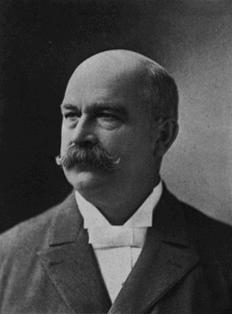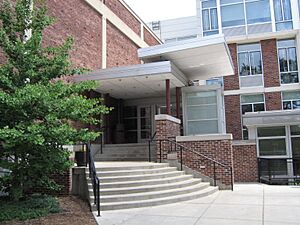Francis Wayland Parker facts for kids
Francis Wayland Parker (October 9, 1837 – March 2, 1902) was a leader in the progressive school movement in the United States. He believed that education should help a person grow in every way. This included their mind, body, and good character. John Dewey, another famous educator, called him the "father of progressive education." Parker worked to create school lessons that focused on the whole child. He wanted students to have a strong background in language. He was against strict rules, endless drills, and just memorizing facts. He helped show that education was not just about putting information into students' minds. Instead, it was about teaching students to think for themselves and become independent people.
Contents
The Life of Francis Parker
Parker was born in Bedford, New Hampshire. He went to public schools there. He started his teaching career at age 16 in a small village in New Hampshire. He taught 75 children and earned 15 dollars a month. Many of his students were older than him. After teaching in a few towns, he became a principal in Carrollton, Illinois, when he was 21.
Parker's Time in the Military
In August 1861, the American Civil War began. Parker joined the army as a private. He was later promoted to lieutenant and then captain. He became a Lieutenant Colonel in January 1865. He served in St. Augustine, Florida. He was captured and held as a prisoner in North Carolina in May 1865.
Returning to Education
After the war, Colonel Parker went back to teaching. He became the head of a normal school in Dayton, Ohio. A normal school was a place that trained teachers. In 1872, he traveled to Germany to study at the Humboldt University of Berlin. In Europe, Parker learned about new teaching methods. These ideas came from European thinkers like Jean-Jacques Rousseau and Johann Heinrich Pestalozzi.
Parker believed that students learn best when they read interesting books. He thought this helped them use what they already knew. He supported teaching reading in a balanced way. This included using phonics and word families. He also brought together reading, writing, listening, and speaking skills. Parker thought children should write about things they cared about. He wanted writing to be natural and connected to real-life activities. He believed children should write and draw freely without fear of making mistakes.
The Quincy Method
Between 1875 and 1880, Parker put his ideas into practice. He became the superintendent of schools in Quincy, Massachusetts. He got the job because of his strong personality and desire to change schools. There, he created the Quincy Method. This method got rid of harsh discipline. It also stopped focusing on memorizing facts. Instead, it used new ideas like group activities and teaching arts and sciences. Teaching became more informal. He did not like tests, grades, or ranking students.
The Quincy Method was seen as a success. In 1879, state tests showed that students in Quincy did better than other students in Massachusetts. This happened even though critics doubted his new methods.
Leading Schools in Chicago
Parker continued to use his ideas as superintendent of the Boston Public Schools (1880–83). He then became the principal of the Cook County Normal School in Chicago (1883–99). While there, he kept trying new things with the children. He wanted to make his teaching plan better. He was not afraid to fail, saying, "The road to success is through constant blundering."
With his friendly personality and new ideas, he changed the Cook County Normal School. Reading, spelling, and writing became one subject called "communication." Art and physical education were added to the weekly schedule. He taught science by studying nature. He even started a band with the children who studied music.
During this time, Parker wrote five books about education. Dartmouth College gave him a master's degree in 1886. Later, Parker started his own private experimental school, the Chicago Institute (1899–1901). This school became part of the University of Chicago School of Education in 1901.
Founding New Schools
In 1901, Parker joined his Chicago Institute with the University of Chicago Laboratory Schools. He worked with kindergarten and elementary school children. To use his ideas even more, the Francis W. Parker School opened in Chicago. It started with 180 students. A second school, the Francis W. Parker School, was founded in San Diego in 1912. Both schools are still open today.
Parker became ill and was sent to the South for a better climate. He died at age 64 in Pass Christian, Harrison County, Mississippi. His ashes were returned to New Hampshire.
Many schools are named after Francis W. Parker. These include schools in New York, Illinois, Indiana, and California. The Francis W. Parker Charter Essential School was founded in Massachusetts in 1995. This was to honor his important work in progressive education. An elementary school in Quincy and one in Rochester, N.Y. also carry his name.
See also
- Alternative Education
 | William M. Jackson |
 | Juan E. Gilbert |
 | Neil deGrasse Tyson |



